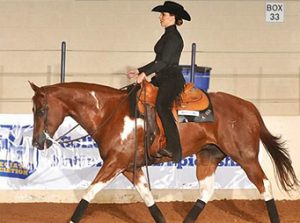NCEA – Balancing Collegiate Competition With Breed Show Aspirations
Click here to read the complete article82 – March/April 2019
By Cameron Crenwelge
 Tests, quizzes, and grades are just a few of the many worries that youth competitors have to juggle while competing at horse shows throughout the school year. As much as I wish I could say that these worries disappear the second you move away to college and “become your own person,” they don’t. Furthermore, if you choose to ride on a collegiate equestrian team, communication about possible days you might miss, workout make-ups, and keeping coaches up to date with your schedule will likely be added to the ever-growing list of items you’re expected to juggle. I spoke with AQHA World Champion riders and current Texas A&M Equestrian Horsemanship starters, Alex Albright and Sarah Orsak, to give a little insight into what juggling full academic schedules, NCEA competition, and AQHA competition entails.
Tests, quizzes, and grades are just a few of the many worries that youth competitors have to juggle while competing at horse shows throughout the school year. As much as I wish I could say that these worries disappear the second you move away to college and “become your own person,” they don’t. Furthermore, if you choose to ride on a collegiate equestrian team, communication about possible days you might miss, workout make-ups, and keeping coaches up to date with your schedule will likely be added to the ever-growing list of items you’re expected to juggle. I spoke with AQHA World Champion riders and current Texas A&M Equestrian Horsemanship starters, Alex Albright and Sarah Orsak, to give a little insight into what juggling full academic schedules, NCEA competition, and AQHA competition entails.
EC: “How do you balance a breed competition schedule while competing on a collegiate equestrian team?”
Alex: “After making the commitment to be part of an equestrian team, I knew that my schedule for AQHA competition was going to be much tighter than it had been previously. I had not only committed to an equestrian team; but, I also committed to Texas A&M University, and I’m expected to excel academically. I soon came to realize that college is a whole new ball game, scholastically, and that’s even more difficult when you add a collegiate competition schedule on top of that. In addition, missing meets for outside competitions needs to be limited to only the most important and major horse shows. Even so, many girls on the team will fly in and out of these horse shows on the weekends to avoid missing class and practice. Showing on the breed circuits becomes easiest during team off-time. We’re lucky enough to get all of Christmas break and most of spring break to ourselves; that’s the best time for stress-free, outside competition.”
Sarah: “It can be very difficult to regularly compete in AQHA competitions while on an equestrian team. Schedules overlap and conflict the majority of the time, so I try to show as much as I can over the summer and go to shows close to College Station during the school year. It’s also difficult to make progress with my own horse because I may only get to practice twice a semester. My trainer does a great job of making sure that my horse is well prepared so I can be confident. I want to put the team first and foremost, so I work around the season the best I can.”
Click here to read the complete article82 – March/April 2019










